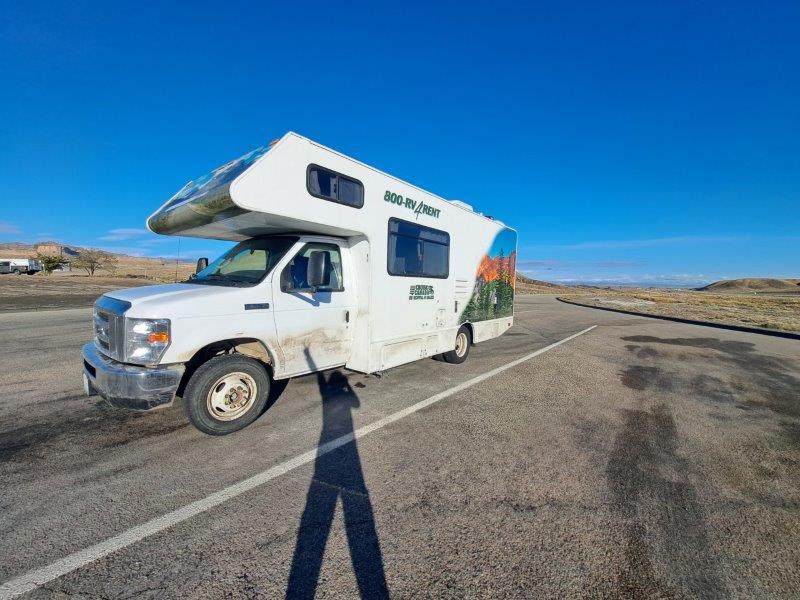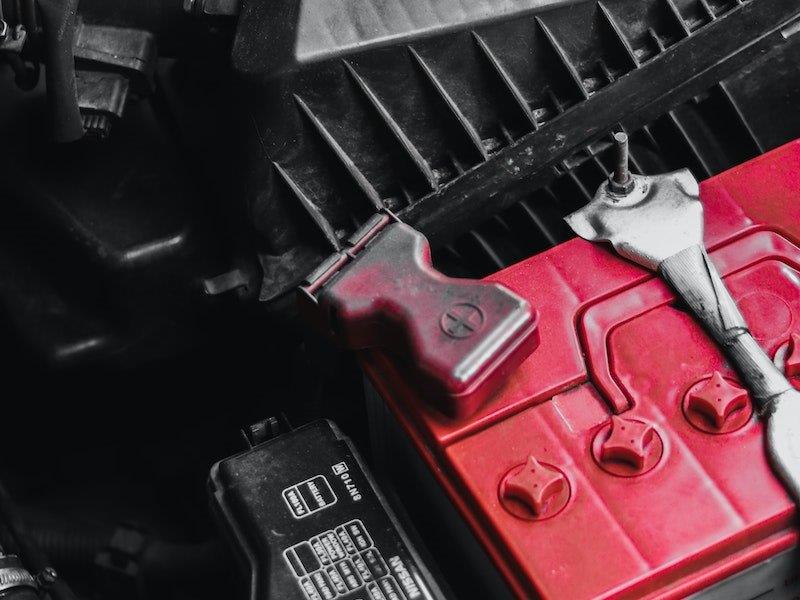If you use your RV for road trips regularly, you know how important it is to have a reliable battery to power all of your adventures all year-round. With so many different types of batteries on the market, however, it can be difficult to find a good one for your specific needs.

In this guide, we’ll break down everything you need to know about buying RV batteries, from the types of RV batteries, factors to consider before making a purchase, and additional tips to keep in mind before swiping your credit card. We’ll also provide some information on maintaining your battery, so it can last for as many fun trips as possible.
By taking these considerations into account, you can make the best and most informed decision possible for your next RV battery purchase.
Types of RV Batteries
Believe it or not, there are actually a few different types of RV batteries! You should always choose the right battery for your specific needs, whether you’re considering the type of RV you have or the level of budget you’re working with.

Lead-Acid Batteries
Lead-acid batteries are the most common RV batteries you’ll find at the store. Because they’re easy to find locally and more affordable than other battery types, they’re often a first choice for RVers on a budget.
Lead-acid batteries have two different types: sealed lead-acid batteries and flooded lead-acid batteries. Flooded lead-acid batteries will need regular maintenance, such as adding water to the cells, while sealed lead-acid batteries require little to no maintenance.
While it sounds like a lot of work, some RV owners prefer flooded lead-acid batteries, as this maintenance allows them full control over monitoring their battery’s health. If you want something less hands-on, however, sealed lead-acid batteries are a better choice.
Absorbent Glass Mat (AGM) batteries, for example, are a type of sealed lead-acid battery that has a longer life, faster charging and performs Absorbent Glass Mat (AGM) batteries better in cold weather. AGM batteries are also less prone to leaking and can be installed in any orientation. This type of lead-acid battery is a good choice for campers spending their travel in rugged, frigid climates.
Gel batteries, on the other hand, are another type of sealed lead-acid battery that are similar to AGM batteries, but have a gel-like electrolyte instead of liquid. They’re similar in price to AGM batteries but tend to perform better in hot temperatures instead. If you plan to spend your summer with your RV in a hot, sandy desert, Gel lead-acid batteries may be the best choice for you.
Sealed lead-acid batteries are much easier to deal with for all of these reasons, but they’re also a bit more expensive as a result. When it comes to choosing a lead-acid battery, you’ll have to decide between saving money and saving time and effort later. You also have to decide what type of terrain you’re travelling over, and the climate you’re travelling in to pick a battery that will work optimally during your trip.
Lithium-Ion Batteries
Lithium-ion batteries are a newer type of RV battery that is becoming more common among RVers these days. They cost more than lead-acid batteries but offer several advantages including a longer lifespan, faster charging, and more efficient use of energy, which means they use more of their capacity than other battery types.
Lithium-ion batteries are also smaller and more lightweight than lead-acid batteries, which makes them an excellent choice for RVers who are trying to save space. This also means they won’t weigh your camper down much, and are much easier to install.
However, lithium-ion batteries aren’t always compatible with every camper type, so be sure to check your system requirements to see if this is an option for you. You should also keep in mind that there are specific safety requirements for recycling your lithium-ion batteries when it is time to replace them.

Factors to Consider when Choosing RV Batteries
Before selecting an RV battery, there are a few different factors to consider, from voltage to cost.
Battery Capacity
Your RV battery’s capacity is the amount of energy that it can store. Battery capacity is measured in ampere-hours (Ah). The higher your battery’s capacity is, the longer it can power your RV’s electrical devices over time.
You always want to make sure the capacity of your RV’s battery is compatible with your electrical needs while you’re camping, otherwise, you could run out of power too soon.
Battery Size
The size of battery your RV can hold depends on the space available in your RV. You should always measure your RV’s battery compartment or storage area to make sure the new battery will fit before purchasing it.
Most RV batteries are in size group 24, which is around 10.25 inches in length, 6.75 inches in width, and 8.875 inches in height. However, some larger RVs may require batteries in groups 27 or 31, which are even bigger than group 24.
The more power and capacity you need, the bigger of a battery your RV will require. Check your RV’s specific electrical needs to determine which size will provide enough power while still fitting in your RV.
If you need a larger battery than will reasonably fit, you may have to modify your battery compartment to create more space, though you should only do this with an experienced professional. If all else fails, installing an external battery box on the outside of your RV may give you the space you need to carry a larger battery without having to make many internal adjustments.
Battery Weight
In addition to size, you should also consider your battery’s weight. The larger your battery’s size is, the heavier it will be.
Lead-acid batteries can weigh anywhere between 40 to 70 pounds, while lithium-ion batteries average around 20 pounds.
An extremely heavy battery will add a lot of weight to your RV, which can impact your fuel economy. It can also affect your RV’s balance, which can be especially serious for small or lightweight RVs. Plus, you could end up damaging your battery compartment if it is not equipped to handle a lot of extra weight.
Getting the right size and weight of the battery can prevent these issues. If you really must get a heavier battery, make sure you modify your battery compartment to handle the extra weight or add an external battery compartment in a place that won’t cause issues with your RV’s balance.
You could also choose to invest in a lighter lithium-ion battery, which may be more expensive up-front, but will save you later on gas costs and potential damage from a too-heavy battery.
Battery Voltage
RV batteries come in two voltage types: 6-volt and 12-volt. While 12-volt batteries are typically the most common in RVs today, some older models may instead require two 6-volt batteries wired in series to provide a 12-volt output. Be sure to check your camper’s specific needs before purchasing a battery based on voltage.
Battery Cycle Life
A battery’s cycle life is the number of times it can charge and discharge before it begins to degrade. Lead-acid batteries typically have shorter life cycles than lithium-ion batteries, but this depends on many factors including the amount of time you use your RV for. Lithium-ion batteries, for example, have been known to last over 10 years.
Cost
This is often one of the first factors you’ll consider before making a purchase. You’ll have to consider your budget before choosing a battery for your RV.
RV battery cost is based on several different factors including type, size, voltage, and quality.
On average, lead-acid RV batteries (such as group 24 and 27) can cost anywhere between US$50-150, while larger ones (like group 31) can cost anywhere from US$150-500 and up. The more high-quality of a battery you find, the more expensive it will be. However, it will likely last longer too.
For lithium-ion RV batteries, smaller models will run you anywhere between US$500-2,000, while larger ones can cost over US$2,500, even up to $10,000-15,000! Keep in mind that while these types of batteries are more expensive up-front, they save you time, energy, and money in the long run due to less maintenance and longer lifespans.
Maintenance Requirements
As mentioned previously, different batteries have different types of maintenance requirements. Flooded lead-acid batteries require more maintenance, such as filling with water, while lithium-ion batteries have little to no maintenance required besides eventual replacement.
If you want to do as little maintenance as possible, investing in a sealed lead-acid battery or a lithium-ion battery may be worth the increased cost. If you prefer to have full control over your battery, doing regular maintenance on a flooded lead-acid battery may be more your style.
Compatibility With the RV’s Electrical System
Before shopping for a battery, you should always check your RV’s manual to see which batteries are compatible with your electrical system. The battery must have the proper voltage and capacity for your power needs, and it must also be able to be safely charged by your RV’s charging system.

Buying RV Batteries: Tips and Considerations
Before buying your RV battery, there are a few tips and considerations to keep in mind to help you make the most informed decision possible. Here are four of our top tips to keep in mind before hitting the store!
Look for High-Quality Batteries
Not all batteries are made the same. In addition to selecting a type of battery, you should also consider the company that manufactures the battery. Make sure you pick from a reputable brand that has past experience making these batteries.
You should also take a look at customer reviews and feedback to determine if the battery or brand you’re considering is a good one. Customer reviews from verified buyers are the best way to determine if a product is high-quality, as it gives first-hand experience from someone who already spent money to buy the product and try it themselves.
Where to Buy RV Batteries
There are a few different places you can go to find RV batteries:
- RV Dealerships – These are some of the best locations you can go to find an RV battery. Workers at these dealerships can help you find a battery that fits your RV model and budget that is best for your purposes.
- Online Retailers – If you don’t live near any of the above sellers, the internet offers a variety of great battery choices to choose from. Consider ordering from Amazon, Camping World, or Battery Mart to find the battery you need to fit your specific RV model. Plus, you can often see first-hand reviews from past customers by buying online!
- Automotive Stores – Auto stores such as AutoZone, NAPA, and O’Reilly Auto Parts sometimes sell RV batteries. However, you should try calling ahead to make sure they have the right batteries for your needs.
- Battery Stores – In case you didn’t know, some stores specialize just in selling different types of batteries! Some of these locations, such as Batteries Plus, may carry RV batteries and can help you find one that fits your needs.
Warranties and Return Policies
Oftentimes, your RV battery may come with a warranty that is backed by a specific return policy. You should always read the warranty and return policies on a new battery to understand what they cover and for how long you are covered. The length and terms of the warranty can vary depending on several factors, such as the manufacturer and retailer.
For example, if a battery fails due to a manufacturer defect during the warranty period, the manufacturer may offer a replacement or repair. However, if the battery fails due to misuse, neglect, or damage, the warranty may not cover the replacement or repair.
Additionally, some warranties may require that the battery be installed by a certified professional to be valid. It is important to read the warranty carefully to understand any installation requirements so you don’t accidentally void your warranty!

Battery Testing and Maintenance Services
RV battery testing and maintenance services are available from a variety of retailers and service providers. These services can help ensure that your RV battery is in good condition and performing optimally, which can save you money on replacements in the long run.
Some common RV battery testing and maintenance services include:
- Battery Load Testing – A battery load test can help determine if your battery is able to hold a charge and perform at full capacity. A technician will use special equipment to measure the voltage and current of your battery while it is under load.
- Battery Maintenance – Properly maintaining your battery can help extend its lifespan. A maintenance check may include checking and topping off electrolyte levels, checking terminals for corrosion, or simply cleaning the battery case.
- Battery Charging – If your battery fully runs out or can’t hold a charge, a technician may be able to charge it back to full capacity. They may use a battery charger or similar equipment to get it fully charged. If they cannot get it charged, it may be time for a replacement battery.
- Electrical System Testing – If you’re having problems with your electrical system, a technician can perform electrical system testing to determine if the problem is your battery or the system itself. From there, they can help you come up with a solution to the issue.
RV Battery Review Compilations
To learn more about different types of RV batteries, check out our compilation of RV battery reviews across the site.
Best RV Battery Overall
Best RV Battery Based on Specifications
Best RV Battery Based on Type of Camping
Conclusion
When it comes to buying a new RV battery, keep in mind that there are several things to consider. From the many types of batteries available to the different factors to remember (size, voltage, etc.), there is a lot to take into account. Buying an RV battery is a big decision, and you want to make sure you’re making a good one.
Remember to consider your specific needs and budget, and to only purchase batteries from reputable manufacturers and retailers. You should also be sure to read all warranty and return information before making your purchase, in case you have any issues with your battery afterwards.
By considering all of these factors and tips, you can make an informed decision when buying your next RV battery, so you can adventure worry-free for a long time.
